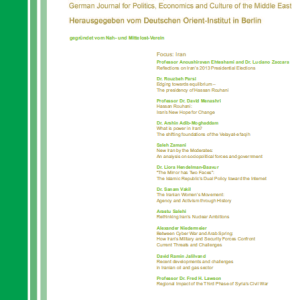Shop
Showing 49–64 of 342 resultsSorted by latest
-

Orient III 2013 – Tranformation Processes in the Arab world
26,00 €incl. VAT
Add to basket -

Regional Impact of the Third Phase of Syria’s Civil War
7,90 €incl. VAT
Add to basket -

Rethinking Iran’s Nuclear Ambitions
7,90 €incl. VAT
Add to basket -

Between Cyber War and Arab Spring: How Iran’s Military and Security Forces Confront Current Threats and Challenges
7,90 €incl. VAT
Add to basket -

Recent developments and challenges in Iranian oil and gas sector
7,90 €incl. VAT
Add to basket -

The Iranian Women’s Movement: Agency and Activism through History
7,90 €incl. VAT
Add to basket -

New Iran by the Moderates: An analysis on sociopolitical forces and government
7,90 €incl. VAT
Add to basket -

“The Mirror has Two Faces”: The Islamic Republic’s Dual Policy toward the Internet
7,90 €incl. VAT
Add to basket -

What is power in Iran? The shifting foundations of the Velayat-e faqih
7,90 €incl. VAT
Add to basket -

Hassan Rouhani: Iran’s New Hope for Change
7,90 €incl. VAT
Add to basket -

Edging towards equilibrium – The presidency of Hassan Rouhani
7,90 €incl. VAT
Add to basket -

Reflections on Iran’s 2013 Presidential Elections
7,90 €incl. VAT
Add to basket -

Orient IV 2013 – Iran
26,00 €incl. VAT
Add to basket -

Trump’s Second Term Foreign Policy: A Study in Chaos
7,90 €incl. VAT
Add to basket -

Turkish-American Relations in the Middle East under Trump 2.0
7,90 €incl. VAT
Add to basket -

Edging towards equilibrium – The presidency of Hassan Rouhani
7,90 €incl. VAT
Add to basket


